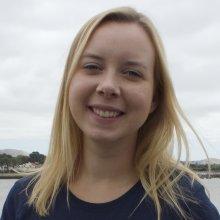
Ashley Davis
Tell us about your work/research. What kinds of things do you do?
I am pursuing a career in paleoceanography which is the study of past conditions in the oceans. At the U of SC, my senior thesis focused on reconstructing ocean acidification in the southern Caribbean Sea using fossilized plankton shells that were buried in sediment over the last 800 years. These shells were collected using a sediment core which was drilled from the seafloor, then the core was sliced into segments, and each sample was washed and filtered to get rid of the dirt so that we would have plankton shells left. The plankton shells I use are very small and look like grains of sand with the naked eye. There is a relationship between the area and weight of the shells and a compound called carbonate ion which can tell us about seawater acidity, so I had to individually weigh and measure over 2000 of these tiny shells. My reconstructed record shows that the ocean is acidifying at a faster rate due to our increasing carbon dioxide emissions. Now that I have graduated, I am starting a Ph.D. in the fall at the Victoria University of Wellington in New Zealand where I will be using deep-sea coral skeletons to reconstruct ocean circulation and seawater nutrients around New Zealand!
What sparked your initial interest in your career?
In high school, I had to complete a year-long research project as one of the requirements for my STEM program. As I was trying to develop project ideas, I stumbled across the issue of ocean acidification which occurs when carbon dioxide from the atmosphere dissolves in seawater and causes the pH to become more acidic. This can make it harder for organisms like corals, mollusks, and some species of plankton to build and maintain their shells and skeletons which are susceptible to dissolving when seawater pH is more acidic. We rely on these organisms to form the basis on many marine food webs and to provide habitat for other organisms that humans rely on for food and tourism. I was astounded that the carbon dioxide we produce on land could be affecting organisms that live at the bottom of the oceans, and this spurred me to pursue marine science when I got into college.
Who influenced you or encouraged you the most?
My research mentors at my university and summer research internships have been instrumental in encouraging me to pursue a career in paleoceanography. From them, I have learned about lab techniques, data analysis, scientific communication, and writing, but their passion and excitement for their research was the largest inspiration for me. My parents are by far my biggest supporters, and they have always given me the freedom to pursue my goals. They have been there to encourage me through my failures and to celebrate my successes, and I could not be more thankful for them.
What element of your work/study do you think is the most fascinating?
As a paleoceanographer, I feel like a climate detective trying to piece together clues from the shells and skeletons of marine organisms to figure out what conditions were like in the oceans hundreds and thousands of years ago. It is always an exciting moment when I get a first look at the data that I have been working on generating and to think that I am seeing something for the first time that no one else has seen. It truly is amazing what secrets are hiding in the ocean just waiting to be found!
What other jobs led you to your current career?
I participated in two Research Experience for Undergraduates (REUs) which are summer research internships at various universities that are funded by the National Science Foundation. My first was at Texas A&M University where I studied ocean acidification around deep-sea coral reefs in the Northwestern Hawaiian Islands, and my second was at the Woods Hole Oceanographic Institution where I reconstructed sea surface temperatures near the Bahamas from 125,000 years ago. REUs are a fabulous way to get the first-hand experience in research and solidified my decision to pursue a career in the field of oceanography.
What are your degrees and certifications?
Bachelor of Science in Marine Science and Chemistry -- University of South Carolina 2019
What are your hobbies?
I really enjoy getting outside to mountain bike, kayak, sail, swim, and hammock. You will often catch me coming up with new ocean-themed puns to spice up my Instagram or reading books about ocean voyages!
How did you get involved with the Nautilus Exploration Program?
I applied to the SEIP program and was selected to be an Ocean Science Intern, so I will get to learn how data is collected from the ROV and how samples that are collected in the deep-sea are processed back onboard the EV Nautilus.
What advice would you give someone who wants to have a career like yours?
I highly encourage other students to pursue different internships and opportunities at their schools to get experience in areas they are interested in pursuing their career. This has been the most helpful for learning the ins and outs of oceanographic research. It is amazing how opportunities just seem to follow one another and many of the things I do now have come from connections I made previously or work experience I have had. Also, do not get discouraged if opportunities do not work out. The amount of things I have applied for is much higher than the number of things I have gotten, and I always encourage people to persevere and eventually something will work out.
Expeditions
Ashley participated in the following Ocean Exploration Trust expeditions:
